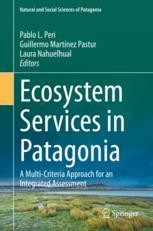Ver ítem
- xmlui.general.dspace_homeCentros Regionales y EEAsCentro Regional Patagonia SurEEA Santa CruzLibrosxmlui.ArtifactBrowser.ItemViewer.trail
Ecosystem Services in Patagonia: A Multi-Criteria Approach for an Integrated Assessment
Resumen
This book aims to quantify and discuss how societies have directly and indirectly benefited from ecosystem services in Patagonia; not only in terms of provisioning and cultural services, but also regulating and supporting services. Patagonia, a region that stretches across two countries (ca. 10% in Chile and 90% in Argentina), is home to some of the most extensive wilderness areas on our planet. Natural grasslands comprise almost 30% of the Americas,
[ver mas...]
This book aims to quantify and discuss how societies have directly and indirectly benefited from ecosystem services in Patagonia; not only in terms of provisioning and cultural services, but also regulating and supporting services. Patagonia, a region that stretches across two countries (ca. 10% in Chile and 90% in Argentina), is home to some of the most extensive wilderness areas on our planet. Natural grasslands comprise almost 30% of the Americas, including the Patagonian steppe, while Patagonian southern temperate forests are important for carbon sequestration and storage, play a pivotal role in water regulation, and have become widely recognized for their ecotourism value. However, profound changes are now underway that could affect key ecosystem functions and ultimately human well-being. In this context, one major challenge we face in Patagonia is that ecosystem services are often ignored in economic markets, government policies and land management practices. The book explores the synergies and trade-offs between conservation and economic development as natural landscapes and seascapes continue to degrade in Patagonia. Historically, economic markets have largely focused on the provisioning services (forest products, livestock) while neglecting the interdependent roles of regulating services (erosion and climate control), supporting services (nutrient cycling) and cultural services (recreation, local identity, tourism). Therefore, the present work focuses on ecosystem functions and ecosystem services, as well as on trends in biodiversity and the interactions between natural environments and land-use activities throughout Patagonia.
[Cerrar]

Editor - Compilador
Peri, Pablo Luis;
Martínez Pastur, Guillermo José;
Nahuelhual, Laura;
Fecha
2021-04-27
Editorial
Springer Nature
ISSN
2662-3463
2662-3471
2662-3471
ISBN
978-3-030-69165-3 (hardcover)
978-3-030-69168-4 (Softcover)
978-3-030-69166-0 (eBook)
978-3-030-69168-4 (Softcover)
978-3-030-69166-0 (eBook)
Formato
pdf
Tipo de documento
libro
Palabras Claves
Derechos de acceso
Restringido
 Excepto donde se diga explicitamente, este item se publica bajo la siguiente descripción: Creative Commons Attribution-NonCommercial-ShareAlike 2.5 Unported (CC BY-NC-SA 2.5)
Excepto donde se diga explicitamente, este item se publica bajo la siguiente descripción: Creative Commons Attribution-NonCommercial-ShareAlike 2.5 Unported (CC BY-NC-SA 2.5)

